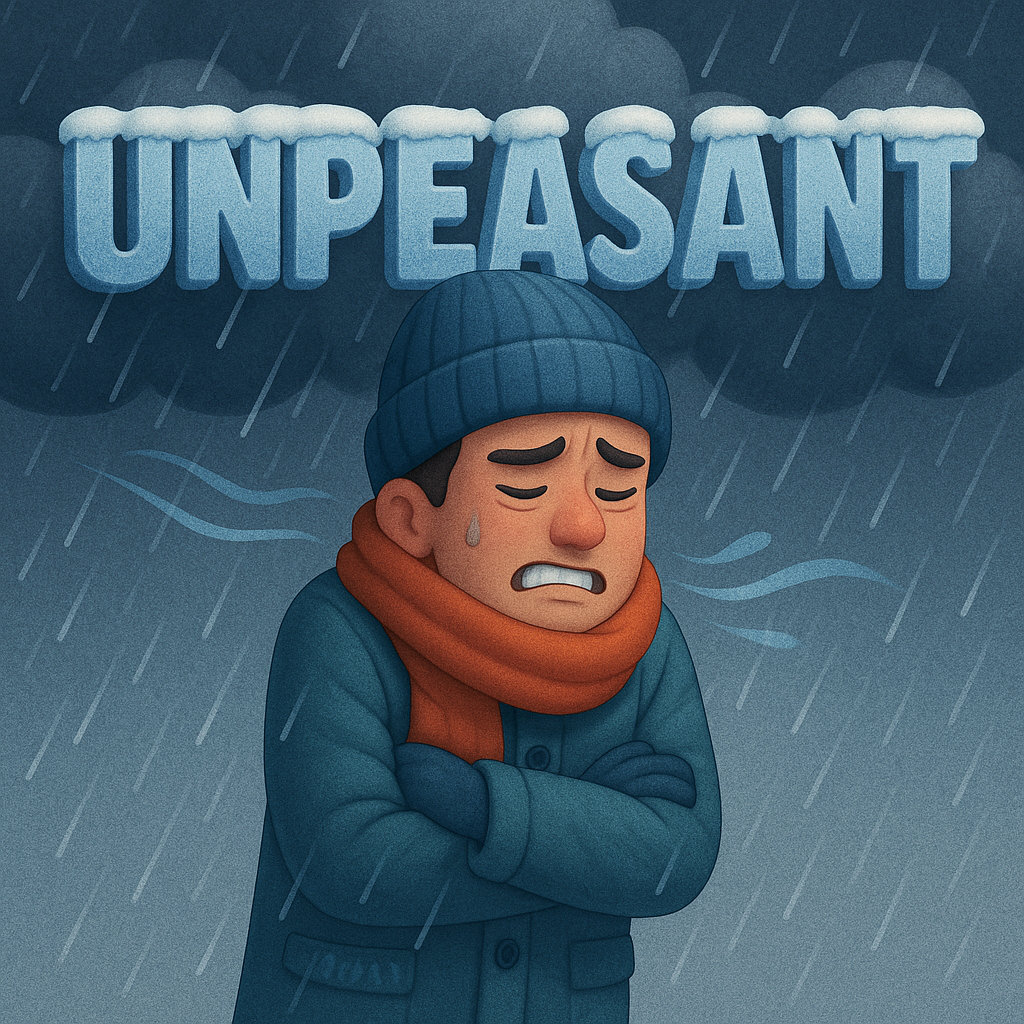Unpleasant
Definition
Unpleasant refers to something that is not enjoyable, agreeable, or pleasing, often causing discomfort or dissatisfaction.
Parts of Speech
- Adjective
Pronunciation
American English
- IPA Pronunciation: /ʌnˈplɛz.ənt/
- Respelling: un-PLEZ-uhnt
British English
- IPA Pronunciation: /ʌnˈplɛz.ənt/
- Respelling: un-PLEZ-uhnt
Etymology
The word "unpleasant" is formed by combining the prefix "un-" (meaning "not") with "pleasant," which originates from Old French "plaisant," meaning "pleasing or agreeable." The term evolved in Middle English to denote something disagreeable or undesirable.
Derivatives
- Unpleasantly (adverb)
- Unpleasantness (noun)
- Pleasant (adjective, antonym)
- Displeasing (adjective)
- Nonpleasant (adjective, rare)
Synonyms
- Disagreeable
- Uncomfortable
- Distasteful
Antonyms
- Pleasant
- Enjoyable
- Agreeable
Usage
The adjective "unpleasant" is often used to describe situations, sensations, or experiences that are not enjoyable. For example, "The smell in the room was unpleasant." It can also refer to interactions or behavior, such as "His tone was unpleasant during the discussion."
Related Terms
- Discomfort: A state of physical or emotional unease.
- Annoyance: The feeling of being irritated or displeased.
- Aversion: A strong dislike or unwillingness.
Detailed Definitions
Adjective
- Not enjoyable or agreeable: Refers to something that causes dissatisfaction or displeasure.
- Example: "The weather was cold and unpleasant during the trip."
- Causing discomfort or annoyance: Describes situations or sensations that are irritating or unwelcome.
- Example: "The unpleasant odor lingered for hours."
- Socially or emotionally disagreeable: Refers to behavior or interactions that cause unease or conflict.
- Example: "The argument left everyone in an unpleasant mood."
unpleasant



🇨🇳 Mandarin (Simplified Chinese)
- 不愉快
- IPA: /pu˧˥ y˩˧˥ kuai˥˩/
- English Respell: Bù yúkuài
🇮🇳 Hindi
- अप्रिय
- IPA: /əprija/
- English Respell: Apriya
🇪🇸 Spanish
- Desagradable
- IPA: /desaɣɾaˈðaβ̞le/
- English Respell: Desagradable
🇫🇷 French
- Désagréable
- IPA: /dezagʁeabl/
- English Respell: Désagréable
🇸🇦 Modern Standard Arabic
- مُزعِج
- IPA: /mʊˈzʕɪd͡ʒ/
- English Respell: Muz'ij
🇧🇩 Bengali
- অপ্রিয়
- IPA: /ɔpriɟɔ/
- English Respell: Oprojjo
🇷🇺 Russian
- Неприятный
- IPA: /nʲɪprʲɪˈjatnɨj/
- English Respell: Nepriyatnyy
🇵🇹 Portuguese
- Desagradável
- IPA: /dɨʒaɣɾaˈðavɛl/
- English Respell: Desagradável
🇮🇩 Indonesian
- Tidak menyenangkan
- IPA: /tidak mənjɛnaŋkan/
- English Respell: Tidak menyenangkan
🇩🇪 German
- Unangenehm
- IPA: /ʔʊnaŋˈneːm/
- English Respell: Unangenehm
🇯🇵 Japanese
- 不快な
- IPA: /fukaɪna/
- English Respell: Fukai na
🇻🇳 Vietnamese
- Khó chịu
- IPA: /kʰɔ˧˥ cɪw˧˩˧/
- English Respell: Khó chịu
🇰🇷 Korean
- 불쾌한
- IPA: /bulʰwehan/
- English Respell: Bulhwehan
🇹🇷 Turkish
- Hoş olmayan
- IPA: /hoʃ olmajan/
- English Respell: Hoş olmayan
🇵🇰 Urdu
- ناپسندیدہ
- IPA: /naːpsandiːdə/
- English Respell: Na-Pasandeeda





